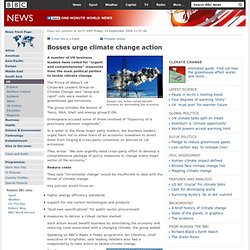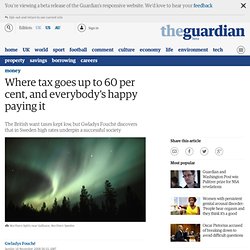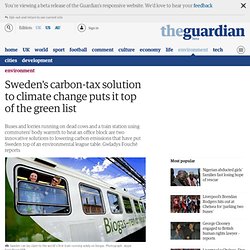

Gazprom looks to expand, both east and west. Bosses urge climate change action. A number of UK business leaders have called for "urgent and comprehensive" measures from the main political parties to tackle climate change.

The Prince of Wales's UK Corporate Leaders Group on Climate Change said "deep and rapid" cuts were needed in greenhouse gas emissions. BBC News Player. The Big Question: Should Africa be generating much of Europe's power? - Africa - World. Why are we asking this now?

Biofuel production 'is harming the poor' - Green Living - Environment. The charity said huge subsidies and targets in developed countries for boosting the production of fuels from plants such as maize and oil palm are exacerbating environmental and social problems in poor nations.

And rather than being a "silver bullet" to tackle climate change, the carbon emissions of some of the fuels are higher than fossil fuels because of deforestation driven by the need for land for them to grow. According to a report, Growing Pains, by Christian Aid, industrial scale production of biofuels is worsening problems such as food price hikes in central America, forced displacement of small farmers for plantations and pollution of local water sources. Bike lanes. Copenhagen Bike Paths - An Example To All Cities. Decoupling Report. Decoupling natural resource use and environmental impacts from economic growth “People believe environmental ‘bads’ are the price we must pay for economic ‘goods.’
However, we cannot, and need not, continue to act as if this trade-off is inevitable" UN Under Secretary-General Achim Steiner, UNEP’s Executive Director By 2050, humanity could devour an estimated 140 billion tons of minerals, ores, fossil fuels and biomass per year – three times its current appetite – unless the economic growth rate is “decoupled” from the rate of natural resource consumption. Developed countries citizens consume an average of 16 tons of those four key resources per capita (ranging up to 40 or more tons per person in some developed countries). Already the world is running out of cheap and high quality sources of some essential materials such as oil, copper and gold, the supplies of which, in turn, require ever-rising volumes of fossil fuels and freshwater to produce.
Powerpoint presentation (PDF) Sweden: Where tax goes up to 60 per cent, and everybody's happy paying it. Political parties have been vying to offer the biggest tax cuts as the credit crunch tightens its grip on Britain.

In their view, low taxes are now the best way to get the economy going and to help out families. Cutting or keeping taxes low has always proved popular with the electorate: in 1992 the Conservatives' election campaign slogan 'Labour's tax bombshell' made the most of the then shadow Chancellor John Smith's intention to increase the higher rate of tax from 40 to 50 per cent. Labour lost. Why Scandinavia can teach us a thing or two about surviving a recession. High numbers of Swedes are employed in the public sector, such as this nurse in a Stockholm hospital.

Photograph: Graham Turner According to liberal thinkers, Scandinavian countries should have drowned in the current economic crisis with their bloated public sectors and a nanny-state mentality that stifles individual creativity. But the opposite has happened. Sweden, Denmark and Norway, where many people pay 50% of their income in taxes – with some even paying 60% – are coping better than most, in particular better than Britain. What does Canada's withdrawal from Kyoto protocol mean? Canada's environment minister, Peter Kent, announces that Canada will withdraw from the Kyoto accord, outside the House of Commons on Parliament Hill in Ottawa, Ontario.

Photograph: Fred Chartrand/AP It's been four years in the offing, but Canada on Monday finally and formally withdrew from the world's only existing legal treaty to cut greenhouse gas emissions, the Kyoto protocol. Despite criticism from environmentalists and the international community – China has called the move "irresponsible" through its state media – Canada is within its legal rights. The environment minister, Peter Kent, said: "We are invoking our legal right to formally withdraw from Kyoto. " Josh Roberts, a US-qualified lawyer at environmental law organisation ClientEarth, points out that article 27 of the Kyoto protocol allows any country to withdraw three years after the protocol is in force, ie about now.
Roberts says that while the get-out clause is fairly standard in international treaties, it is rarely used. Sweden's carbon-tax solution to climate change puts it top of the green list. If there's a paradise for environmentalists, this Nordic nation of 9.2 million people must be it.

In 2007 Sweden topped the list of countries that did the most to save the planet - for the second year running - according to German environmental group, Germanwatch. Between 1990 and 2006 Sweden cut its carbon emissions by 9%, largely exceeding the target set by the Kyoto Protocol, while enjoying economic growth of 44% in fixed prices. Arctic chill brings Facebook data center to Sweden. STOCKHOLM (AP) — Facebook is to build a new server farm on the edge of the Arctic Circle — its first outside the United States — to improve performance for European users, officials of the social networking site said Thursday.

It will also expose them to potential eavesdropping from a Swedish intelligence agency, according to Sweden's Pirate Party, a group opposing government interference with the Internet.